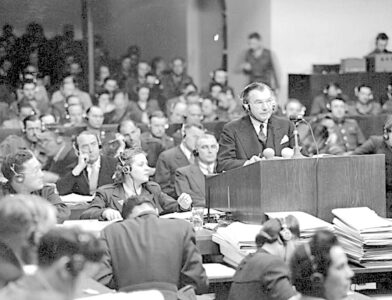Former Conewango Township clerk faces felony charges
A dispute over ownership of Conewango Township’s email account after the 2024 termination of the township’s secretary/clerk has led to six third-degree felony charges against a Warren woman.
Jennifer L. Signorino, 52, was charged Thursday with third-degree felony counts of unlawful access of a computer – access/interfere/damage/destroy; disruption of service; computer theft; computer trespassing – remove data; criminal use of a communication facility and criminal attempt – unlawful duplication as well as a misdemeanor charge of obstructing administration of law/other government function.
A preliminary arraignment was held Thursday in front of Magisterial District Judge Laura Bauer. A preliminary hearing will be held Aug. 20 in Bauer’s court.
Members of the Conewango Township Board of Supervisors asked the Conewango Township Police Department to begin an investigation into possible tampering with the Conewango Township email account that allegedly had taken place March 20, 2024. The case was transferred to the State Police at Warren Criminal Investigation Unit before eventually being transferred again to the State Police Organized Crime Unit in Erie County to avoid a conflict of interest. Information that had been generated from Conewango Township and the State Police at Warren was turned over to the State Police at Erie County. The investigation also includes search warrants for Google records, internet protocol address records and several interviews with Signorino and township officials.
“Due to Conewango Township officials not having access to the Gmail account, the township has incurred multiple unnecessary expenses,” the Affidavit of Probable Cause filed in the case states. “As of this date (Aug. 7, 2025) the township is unable to access any emails or documents that were stored in the conewangotownship@gmail.com email. Not having access has also obstructed the township from functioning proficiently in their day-to-day operations and they are unable to obtain any archived emails that are necessary to function properly.”
“VIEW ONLY”
According to the Affidavit of Probable Cause, township board members held an executive session with Signorino on March 19, 2024, during which she was placed on administrative leave. During the meeting, Signorino asked for access to the Conewango Township email via her cell phone, which was the property of Conewango Township, which also paid for the phone line through the township’s Verizon Wireless Government Account. Signorino owned the phone. Board members decided to allow Signorino access to “view only” the emails on her phone.
Board members requested Chief Jason Peters to complete the secretary/treasurer day-to-day entries in order to continue township operations. The board also requested Peters to recover Signorino’s laptop from her residence. Peters and another officer went to Signorino’s home to recover the laptop.
The next day, Peters asked Mark Lucas, who works for the township as a consultant, to complete information technology tasks that included accessing Quick Books accounts so that past due township bills could be paid. Lucas said that while getting email pin numbers to complete authentications that would allow access to the township’s accounts, the Conewango Township email address account password was changed after completing only two password resets. The reset of the email addresses also stopped access by township officials to the email account altogether, which cut off access to authenticating accounts and any access to past, current or future township emails.
Lucas said he was unable to access QuickBooks files because he didn’t have an administrator password, preventing him from creating a supervisor or administrator login for the program. The only way to reset the administrator password was to receive an email with reset information that was sent to the township’s email address. When Lucas tried to do so the account had multi-factor authentication, which meant the password generated a text message to Signorino’s phone. Around 1:53 p.m. March 20, Lucas lost access to the township’s email address.
On March 26, 2024, the township fired Signorino. A constable delivered a letter that included a list of things Signorino had to return to the township, which included passwords for all township accounts, email addresses, websites and other items that are password protected. The list of items, according to the Affidavit of Probable Cause, included passwords for all CTMA accounts, email addresses, websites and any other password protected items.
CHANGED PASSWORD, FILES DOWNLOADED
Search warrants obtained for the conewangotownship@gmail.com address and associated internet protocol addresses showed the email account was in Signorino’s name. Account recovery emails went to Signorino’s email account while the recovery SMS is also Signorino’s old cell phone number that was in use while she worked for Conewango Township. Signorino’s IP address shows that it was logged into the township email address.
“This is after the password for the email account had been changed, according to Lucas,” the affidavit states. “For this reason it is apparent the defendant knew the new password in order to log into the account after the password was changed.”
On March 20, 2024, someone logged into the township’s Gmail account and downloaded multiple “Takeouts” with a request to send the information to their email and to be sent in specific file formats. Google Takeout is a tool developed by Google that allows users to export and download copies of data stored in a Google account, including files in Google Drive or mail. The data can be stored on a hard drive or uploaded to a cloud storage service.
Peters and Lucas denied knowing what a Takeout was or backing up the email account on March 20, 2024.
Multiple changes were made to the account, some of which happened after Signorino was fired, between March 21, 2024, and October 21, 2024. None of the changes are Conewango Township IP addresses that had been provided by Lucas. Changes include updating information on the account to indicate new phone numbers and email addresses that belong to Signorino, with the only device accessing the account being the cell phone Signorino provided as being the phone she used to access the email account.
“Based on the above listed information, it is evident the defendant has accessed, made changes and obstructed Conewango Township from accessing the conewnagotownship@gmail.com email account after her termination of employment,” the affidavit states. “The defendant also admitted to attempting to back the account up but denied having the backup or knowing where it is at. Due to the defendant’s termination, the defendant was not authorized to access, duplicate and/or make changes to the Gmail account. Although the defendant’s argument is that the account is her account, it is evident the account was created for Conewango Township business purposes, thus the name conewangotownship@gmail.com.”
MISSING INFORMATION
During an October interview by State Police, Signorino allegedly admitted to changing the email password in May 2024 after receiving authentication notifications and thinking someone was trying to hack into the account. Signorino said in October she didn’t know if she changed the email address again on March 20. While the email was the Conewango Township email address, Signorino said the account was also used for personal emails as well.
“The defendant also admitted trying to back up the Gmail account, to preserve the information, but it wasn’t via a Google Takeout,” the affidavit states. “The defendant related she doesn’t have it, it is gone, and she can’t find it (the backup). The defendant related that she lost all access to the email account sometime over this past summer 92024).”
STILL NO ACCESS
As of December 2024, Chief Peters told State Police investigators that the township still didn’t have access to the email account because of the two-factor identification process, nor does the township have access to the archived or previous emails. During a followup interview with Signorino, who spoke to State Police investigators in both instances with her husband present, admitted to making changes listed in the Google Account CHange history except for the service removed change that took place in August 2004.
“The defendant related she was trying to protect the account, and the account is her account, as it is in her name, therefore Conewango Township has no rights to the account,” the Affidavit of Probable Cause states. “The defendant related the password was changed in July of 2024 and she did not do it, but previously admitted to changing the account password in May of 2024, all of which are after she was placed on administrative leave and later terminated. The defendant denied deleting anything from the account. During the interview, the defendant related she still has the phone that was used to access the account and provided a screenshot of the IMEI for the phone, which matched the IMEI listed in the Google records I received.”



